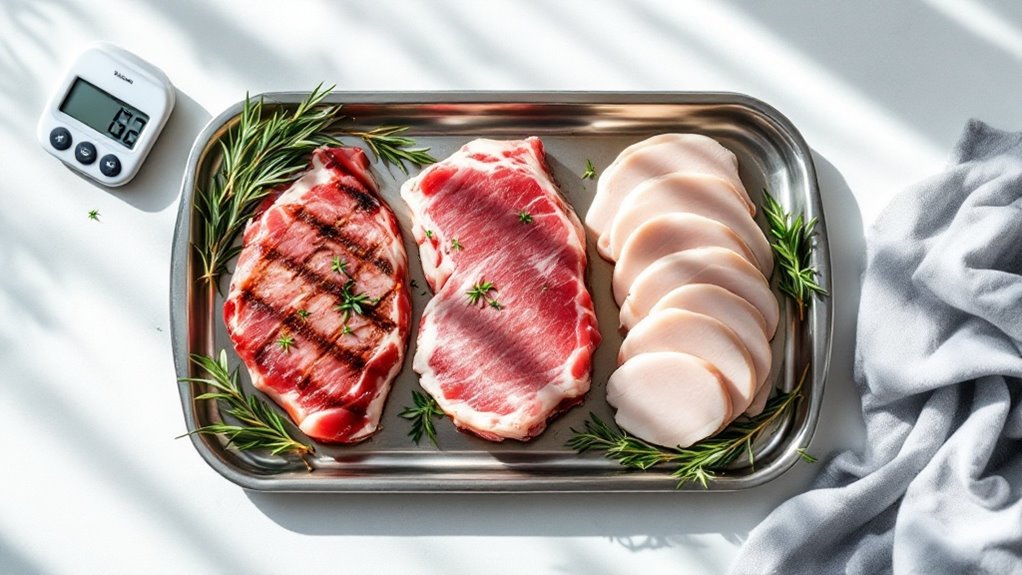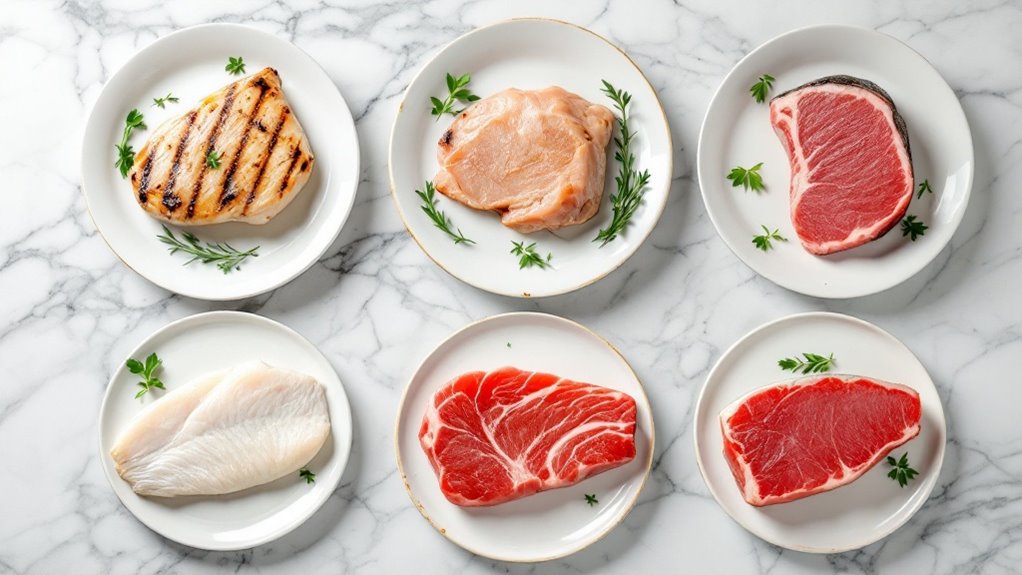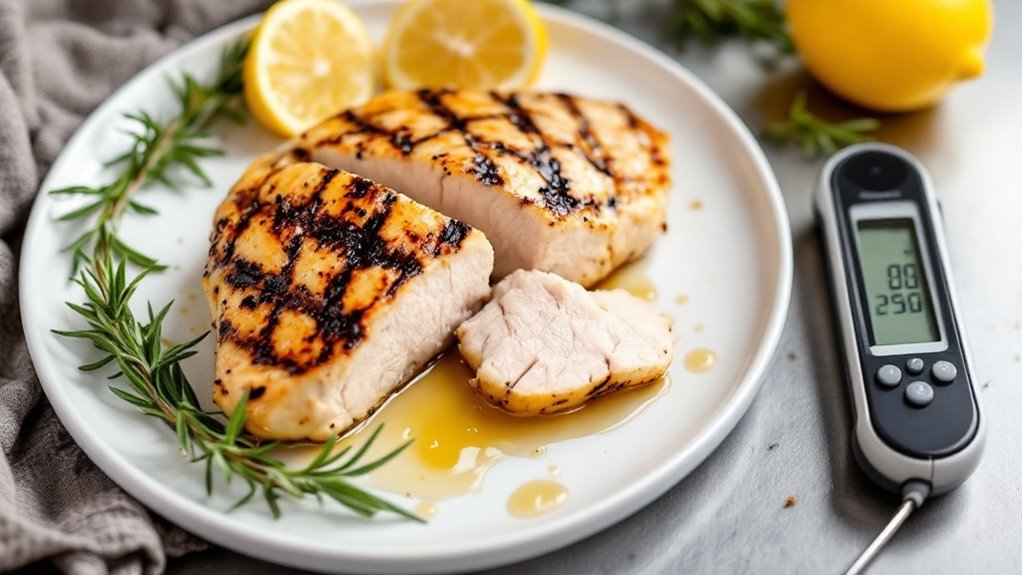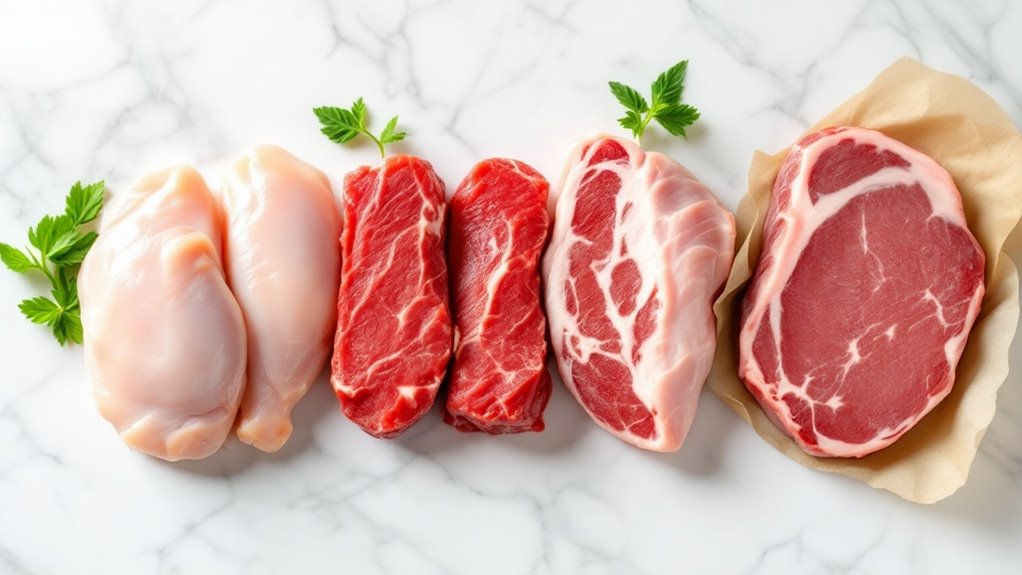Low-Calorie Meats

Low-calorie meats deliver maximum protein with minimal calories, making
Key Takeaways
- Skinless chicken breast is the leanest meat option with only 165 calories and 31g protein per 100g serving.
- Lean meats support weight management while providing essential nutrients like iron, zinc, and B vitamins.
- Fish varieties like cod and tuna offer high protein content with exceptionally low calories, ranging from 82-109 calories per 100g.
- Grilling, broiling, and baking are the best cooking methods to keep lean meats low-calorie while enhancing natural flavors.
- Remove visible fat and skin before cooking, and practice portion control by slicing meat thinly for better texture.
Benefits of Choosing Low-Calorie Meats

Several compelling benefits await those who choose to incorporate low-calorie meats into their diet.
These protein-rich options support weight management while maintaining muscle mass, crucial for both fitness enthusiasts and those starting their wellness journey.
Low-calorie meats provide superior nutritional density, delivering essential nutrients like iron, zinc, and B vitamins without excess calories. This makes them perfect for individuals tracking macros or following structured meal plans.
Low-calorie meats pack a powerful nutritional punch, offering vital minerals and vitamins while keeping calories in check for precise dietary planning.
Moreover, these lean protein sources help increase satiety, reducing overall caloric intake naturally.
For those building a sustainable fitness lifestyle, low-calorie meats offer the perfect balance of protein power and caloric control, making every bite count toward their goals.
Top Lean Meat Options and Their Nutritional Values

A selection of nutrient-dense, lean meats stands ready for health-conscious consumers seeking ideal protein sources.
Skinless chicken breast leads the pack at just 165 calories per 100g, delivering 31g of protein. Turkey breast follows closely with 157 calories and 30g of protein per 100g serving. Lean beef sirloin presents a powerful option at 187 calories with 26g of protein.
Fish options excel in the lean protein category, with cod offering 82 calories and 18g of protein per 100g. Tuna stands out at 109 calories with 24g of protein.
These options provide essential nutrients while supporting muscle maintenance and growth, making them ideal for fitness-focused individuals.
Preparing and Cooking Low-Calorie Meats

Proper preparation techniques transform low-calorie meats into flavorful, satisfying dishes while maintaining their nutritional benefits. Ideal cooking methods include grilling, broiling, and baking, which reduce the need for added fats while enhancing natural flavors. Marinades made with citrus juices, herbs, and minimal oil help tenderize leaner cuts while adding depth.
- Remove visible fat and skin before cooking to minimize calorie content
- Use a meat thermometer to prevent overcooking, which can dry out lean cuts
- Consider portion control by slicing meat thinly across the grain for better texture and presentation
Tips for Selecting and Storing Lean Meats

Successful selection and storage of lean meats requires careful attention to quality indicators and proper handling techniques.
When choosing lean cuts, inspect for bright color, minimal marbling, and firm texture. Chicken breasts, turkey, lean beef rounds, and pork tenderloin should display no discoloration or off-odors.
Store fresh meats at 40°F or below, using the refrigerator's bottom shelf to prevent cross-contamination. Wrap meats tightly in plastic or butcher paper, or seal in airtight containers.
Use fresh poultry within 2 days, red meat within 3-5 days, or freeze immediately. Label packages with purchase dates and rotate stock using the first-in-first-out method.
These protein-rich foods are essential for muscle building goals and overall fitness progress when incorporated into a balanced nutrition plan.
Frequently Asked Questions
Can Eating Only Lean Meats Lead to Nutrient Deficiencies?
Eating exclusively lean meats can lead to several nutrient deficiencies since they lack essential vitamins and minerals found in other food groups.
The body requires nutrients like fiber, vitamin C, calcium, and healthy fats, which aren't present in lean meats. A balanced diet incorporating various food sources – including fruits, vegetables, whole grains, and healthy fats – guarantees ideal nutrition and prevents potential deficiencies.
How Long Does It Take to See Weight Loss Eating Low-Calorie Meats?
Like a well-oiled machine, weight loss results from eating low-calorie meats typically become noticeable within 2-4 weeks when combined with proper caloric deficit.
Individual factors such as metabolism, activity level, and overall diet composition influence the timeline.
Consistent consumption of lean proteins while maintaining a 500-calorie daily deficit can result in 1-2 pounds of weight loss per week.
Are Low-Calorie Meat Substitutes as Filling as Regular Meat Options?
Meat substitutes can be equally filling when properly prepared and portioned.
Plant-based options like tempeh, seitan, and legumes contain high fiber content, which promotes satiety.
However, protein content varies greatly between substitutes, potentially affecting fullness levels.
Success depends on choosing substitutes with substantial protein and fiber content, proper portion sizes, and complementing meals with filling vegetables and complex carbohydrates to maintain satisfaction.
What's the Price Difference Between Regular Meats and Their Leaner Counterparts?
While prices can make your wallet scream in agony, leaner cuts typically cost 20-50% more than their fattier counterparts.
Premium lean cuts like tenderloin often command double the price of regular options.
Ground beef shows similar patterns – 93% lean costs roughly $2-3 more per pound than 80% lean.
The price gap reflects higher production costs and increased market demand for healthier options.
Can Children and Elderly People Maintain Good Health Eating Only Lean Meats?
Children and elderly individuals need a balanced diet that includes various protein sources beyond just lean meats.
While lean meats provide essential nutrients like protein, iron, and B vitamins, relying solely on them can lead to nutritional deficiencies.
Both age groups require diverse food sources including fruits, vegetables, whole grains, and healthy fats for ideal growth, immune function, bone health, and cognitive development.
Final Thoughts
Scientific research consistently confirms that incorporating lean meats into a calorie-conscious diet supports weight management and muscle maintenance. By selecting poultry, fish, and lean cuts of red meat, while mastering proper preparation techniques, individuals can enjoy protein-rich meals without excess calories. The key to success lies in smart shopping, proper storage, and creative cooking methods that enhance flavor while minimizing added fats and calories.


